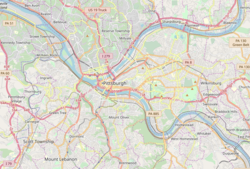| Allegheny Social Hall | |
|---|---|
 | |
| Location | 810-812 Concord Street (East Allegheny), Pittsburgh, Pennsylvania, United States |
| Coordinates | 40°27′28.33″N79°59′50.7″W / 40.4578694°N 79.997417°W |
| Built | 1903 |
| Designated | 2003 [1] |
Allegheny Social Hall located at 810-812 Concord Street in the East Allegheny neighborhood of Pittsburgh, Pennsylvania, was built in 1903. It was built at a time when this area was part of the city of Allegheny, Pennsylvania. The building was added to the List of Pittsburgh History and Landmarks Foundation Historic Landmarks in 2003. [1]
